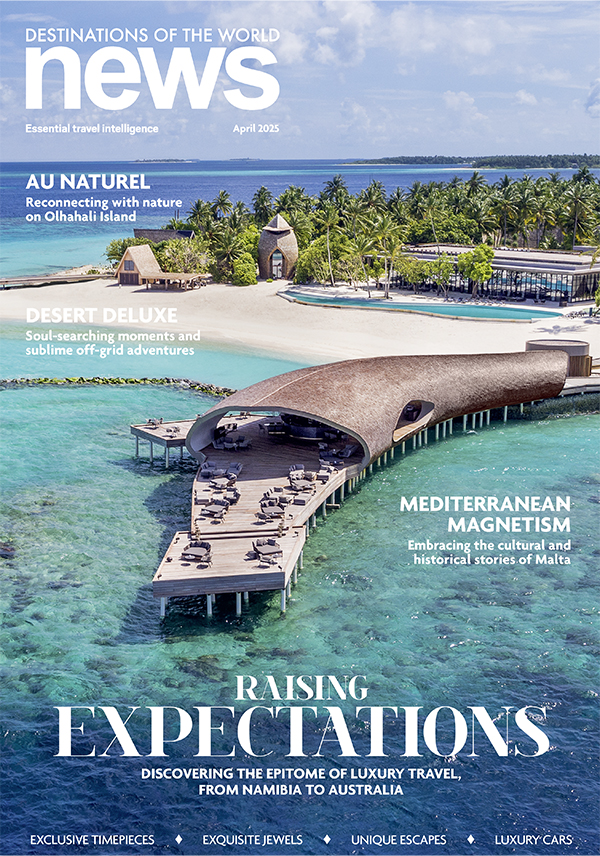There are few men who wouldn’t allow three decades of international success get in the way of being an all-round good guy. Gary Rhodes is not like many men. Since deciding on a career in cooking in his teens, Rhodes has authored 19 books, appeared in numerous TV series and opened a host of successful restaurants around the world, each with its own unique identity.
Since his first job at the Amsterdam Hilton, Rhodes has won six Michelin stars and travelled across the globe exploring new cuisines. But he has always returned to his British roots, making a name for himself by reinventing the once-maligned concept of British cuisine and setting himself apart as the master of ‘Great British Classics’.
You would think that with such a successful empire, Rhodes would be comfortable hanging up his apron, but anyone who eats in his restaurants regularly knows that it’s not unusual to spot the man himself in his chef’s whites making the rounds and chatting to diners. Here he tells DOTW News about his early days on TV, the evolution of British cuisine and what’s next on the Rhodes menu.
You earned your first Michelin star at the age of 26 – how important were those early years in shaping your future career?
The early years in anybody’s career are the most important of all. It’s almost like preparing a new dish, making sure the early preparation is just right so I can reach that final result. In the same sense, I’m always wishing to develop each dish a little more.
When you returned to London in the 1990s, you began to earn a reputation for reviving British food – can you share a bit about this period?
I have to be honest, it was one of the most excit- ing times of my career. I was working ridiculous 18-hour days and feeding over 100 people for lunch and dinner every day. The kitchen was manic but I loved it. I was also so delighted that the British food we were creating was making such a statement.
You opened your first restaurant in 1997 and called it City Rhodes. At this time did you see the potential of “Rhodes” as a global brand?
It’s funny because in my early years as a young trainee chef, I felt I should possibly change my surname – why didn’t it have a French accent on the end, I thought! I never realised how well it could work for me, not just in the London market but anywhere – so thanks mum!
You are one of Britain’s first great celebrity chefs – how has the TV chef phenomenon spread since you first appeared on the screen?
I do wonder whether it has been spread slightly too thin. It’s great to encourage others and hope others are going to add a new personality and style of cooking to the screen. However, I think the era of chefs like Fanny Craddock, the Galloping Gourmet Graham Kerr, Delia Smith and Keith Floyd, just before I hit the TV as a professional chef, were such great years and that identity has been slightly lost. There are many on TV today I don’t even recognise.
How did you first get involved in TV and what do you enjoy about it?
I simply did a cookery demonstration for one of the first TV cooks, a great man called Glynn Christian, at his cookery school which he vid- eoed. He said he thought I had a future in TV. He passed it on to a TV network and literally 48 hours later I was asked if I wanted to make five programmes. The great thing about TV is it provides that time and space to really explain to the viewer how a dish should be prepared and cooked, whereas in the kitchens it can be a little more frantic, with the members of the brigade not quite absorbing what you’re saying.
You often appear in the kitchens of your restaurants around the world – why is it important for you to have a physical presence?
It’s simply because it’s my name above the door. I certainly can’t be in the kitchen every day but when I can, I am.
Design is almost as important as the food in your restaurants – what is your philosophy towards creating the perfect dining environment?
The restaurant for me is a theatre to put on a great show – and let’s not forget that first impressions last.
Your restaurants are certainly considered luxury establishments – what, to you, makes a restaurant luxurious?
Not all of our restaurants are a pure luxury concept, as we have a brasserie in London, which is kept simple and classic. I’ve been very lucky in the opportunities that have come my way but, for me, restaurant designs are very much like my appetite – one moment I want to experience the ultimate and the very next day I may want a simple pizza. So, even with the ‘luxury’ restaurants I’m involved with, each one has its own identity and style, which for me is very important.
What plans do you have for expansion and can you tell us how much the Gary Rhodes food empire is worth?
There are seven restaurants I’m involved with at present, and we are taking on other projects in the Middle East, along with the UK. I hope one day to possibly also be involved in China or Australia. How much the Rhodes empire is worth, I’ve no idea – I’d have to ask my wife!
Giving up the well-paid job and pouring the life savings into a new restaurant concept seems to be en vogue in the UK these days – why do you think this is?
I think because UK eating habits have changed so much, the British public is becoming far more conscious of what they want to eat and where they want to eat it. Without a doubt, it is for me the most exciting career I could have ventured into. I learnt a lot of lessons as a young boy at school and realised at a young age that if I didn’t do my homework I would never pass the exams. So my advice to anyone is to make sure you’ve done all your homework on the area you are opening in, the quantity and style of restaurants that already exist, and make sure you are sourcing and introducing yourself to possible local suppliers. All of these things will help you understand exactly the culinary market you are venturing into.
Where in the world would you most like to open a restaurant?
I’ve opened restaurants now in more places than I ever dreamed I would, so I feel very privileged. However, I have a dream that one day I would love to have a restaurant in the middle of Paris or deep in the South of France, offering purely great British cuisine, so I could convince the French the British can cook!
What do you think of airline food today?
I think airline food has improved dramatically over the years. I travel with Emirates on my trips to Dubai and they always have a great menu and good quality food on offer. The crew always have high level of care and great attention to service.
One of the features in this issue is luxury travel in India. Do you have a favourite place to eat there?
Filming the TV series Rhodes Across India was one of the greatest culinary adventures of my life. It introduced to me a whole new under- standing of true Indian cuisine and quite often the highlights were simple market food created in front of you and then and served, which was really quite exquisite to eat.
RHODES' RESTAURANTS
Rhodes W1 Cumberland hotel, London
Rhodes 24 tower 42, London
Rhodes Calabash Calabash hotel, Grenada
Rhodes Mezzanine Grosvenor House Dubai
Dubai Rhodes twenty10 Le Royal Meridien Beach Resort and Spa, Dubai
Arcadian Rhodes P&O cruise liner Arcadia
Oriana Rhodes P&O cruise liner Oriana








